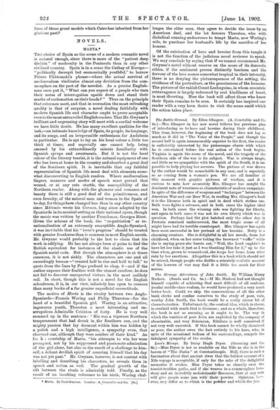NOVELS.
MARTA.*
Tax choice of Spain as the scene of a modern romantic novel is natural enough, since there is more of the "patient deep disdain" of modernity in the Peninsula than in any other civilised country. Spain is in a sense the Cathay of Europe- " politically decrepit but economically youthful," to borrow Prince Ukhtomski's phrase—where the actual survival of mediaevalism vindicates almost any deviation from the com- monplace on the part of the novelist. As a precise English- man once put it, "What can you expect of a people who turn their notes of interrogation upside down and stand their marks of exclamation on their heads?" Thus on the principle that extremes meet, and that in recreation the most refreshing quality is that of surprise, a novel dealing faithfully with modern Spanish life and character ought to prove acceptable even to the most untravelled English readers. That Mr. Gwynne's brilliant and engrossing story will meet with a cordial welcome we have little doubt. He has many excellent qualities for the task,—an intimate knowledge of Spain, its people, its language, and its songs, and an irrepressible enthusiasm for Andalusia in particular. He is apt to lay on his local colour a little too thick at times, and especially one cannot help being amused by his extraordinarily minute familiarity with Spanish syrups and sweetmeats. But it is not the local colour of the literary tourist, it is the natural equipment of one who has been at home in the country and absorbed a great deal of the Southern spirit, It , is inevitable that any faithful representation of Spanish life must deal with elements some- what disconcerting to English readers. Where mediaevalism lingers, manners and modes of speech must prevail that wound, or at any rate startle, the susceptibility of the Northern reader. Along with the glamour and romance and beauty there is still a good deal of the primitiveness, and even ferocity, of the natural man and woman in the Spain of to-day, for things have changed less than in any other country since Merimee wrote his Carmen, long since adopted by the Spaniards in its musical setting as their national opera, though the music was written by another Frenchman. Georges Bizet. Given the scheme of the book, the " re-patriation " or re- nationalisation of an extremely susceptible Anglo-Spaniard, it was inevitable that his " lover's progress " should be treated with greater frankness than is common in most English novels. Mr. Gwynne would probably. be the last to claim that his -work ia edifying. He has not always been at pains to find the British equivalent for instances of the elastic use of the Spanish social code. But though the atmosphere is at times sensuous, it is not sickly. The . characters are one and all exceedingly human—" created half to rise and half to fall," to quote from the lines by Pope prefixed to chap. 6—and if the author exposes their frailties with the utmost candour, he does not fail to discover unexpected virtues in the most unlikely soil. In short, though this is not a novel for the English schoolroom, it is, in our view, infinitely less open to censure than many books of a far greater superficial correctitude.
The motive of Marta is the rivalry between two Anglo- Spaniards—Francis Waring and Philip Thurston—for the hand of a beautiful Spanish girl. Waring is an attractive, ingenuous youth, T,hurston a most interesting and un- scrupulous Admirable Crichton of forty. He is very well summed up in the sentence : "His was a vigorous Northern temperament that had drunk in ,the Southern sun, and the mighty passion that lay dormant within him was hidden by a polish and a high intelligence, a sympathy even, that charmed one, although they were sombre of their kind." As for h s courtship of Marta, "his attempts to win her were prompted, not by his suppressed and passionate admiration of the girl alone, but also as the result of a challenge to him- self, a defiant devilish spirit of assuring himself that his day was not yet past." Mr. Gwyrum, however, is not content with labelling and describing his characters, he reveals them in speech and action as well. The gradual growth of the rift between the rivals is admirably told. Finally, as the result of an insulting reference to his birth, Waring chal- '
• Marta. By Paul Gwynne. London : A..Constable and Co. P3a.]
lenges the elder man, they agree to decide the issue by an American duel, and the lot favours Thurston, who with diabolical cunning endeavours to tempt Marta, now Waring's wife, to purchase her husband's life by the sacrifice of her honour.
Of the extrication of hero and heroine from this tangle it is not the function of the judicious novel reviewer to speak. We may conclude by saying that if we cannot recommend Mr. Gwynne's novel without reserve On the score of its domestic ethics, if the sentiment proves distinctly luscious and the fervour of the love scenes somewhat tropical in their intensity, there is no denying the picturesqueness of the setting, the vividness of the portraiture, or the genuineness of the humour. The picture of the rakish Count Leahuguino, in whom eccentric extravagance is largely redeemed by real kindliness of heart, is most diverting. How the book will affect those who know their Spain remains to be seen. It certainly has inspired one reader with a very keen desire to visit the scene amid which the action takes place,










































 Previous page
Previous page